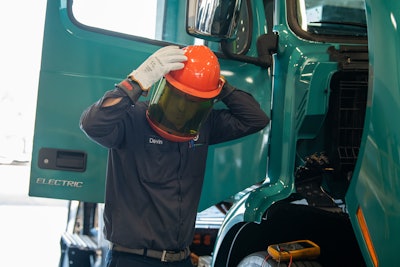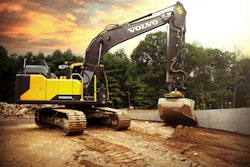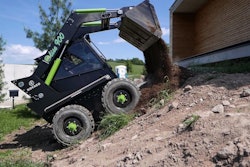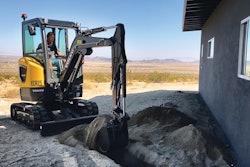
Editor's note: Trucking industry efforts to develop recommended practices for training techs on electric trucks may offer a glimpse of what the construction industry will go through as more electric machines reach the marketplace. Here's what's happening on the trucking side.
Electric vehicle (EV) research and development has become a major business unit for North American truck OEMs (and new industry players), but those efforts still represent a focus on the future rather than a necessity for today.
An American Trucking Associations' Technology & Maintenance Council (TMC) study group intends to develop a recommended practice (RP) for Electric Vehicle Technician Training. Most of the discussion has focused on how fundamentally different EV operation is from conventional diesel engines, and how all service shops (fleets, dealers, independent service providers, etc.) will need to invest heavily in training to ensure their employees can correctly and safely perform EV service.
Kevin Otto, formerly with Cummins, led the discussion during a recent TMC meeting.
In opening the task force meeting, Otto said he estimates nearly every diesel technician working in trucking today will require substantial education on electrical systems to even approach working on EVs, let alone become an expert. Because today’s Class 8 trucks run almost entirely on 12-volt DC power — alternators use AC power within a closed system — most technicians have no experience working on or around higher voltage equipment.
Otto said obviously that will need to change. The electrical power running through a conventional Class 8 truck is dangerous enough. But in a vehicle fully run by batteries? Otto said untrained technicians attempting to service an EV tractor could put themselves in serious danger.
“These battery packs will pack a big wallop,” he said. ‘[Electric trucks] will be foreign for folks who haven’t worked on these systems before.”
That’s where TMC wants to help. Otto said TMC hopes to encourage participation from heavy-duty OEMs to leverage the EV training programs they are already developing for their dealer partners to put together top-level guidance that can be applied across the industry. Once developed, Otto said TMC’s RP won’t attempt to provide granular details on how to complete every EV repair, but it will hopefully offer clear and detailed descriptions of what training a technician needs before being allowed to start an EV service event.
The study group also intends for the RP to address battery testing, charging, shipping and handling, tool requirements and more. Meeting attendees spoke to the importance of each step, noting how dangerous battery packs for heavy trucks could be for an untrained professional.
With electric trucks now available to order but still mostly in development, it’s likely the study group has some time before its RP must be completed. Nevertheless, Otto said the group intends to work quickly once task force leadership is established so the RP beats the Class 8 EVs to the mainstream.











